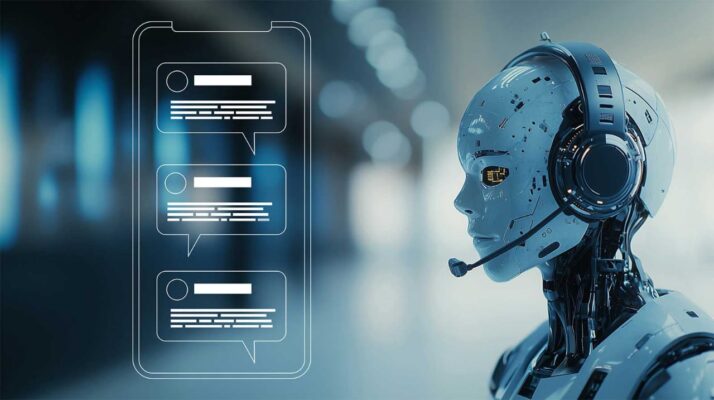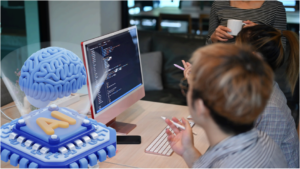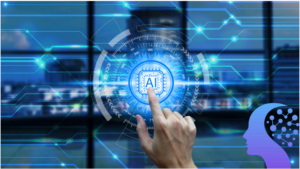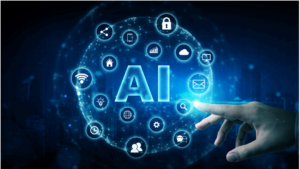
AI is no longer an idea for the future but rather a catalyst for transformation in contemporary business. AI is changing the world, from automating processes to anticipating consumer habits. Having used AI, organizations have a competitive advantage, run more efficient operational processes, and improve overall customer experience.
 How is AI contributing to today’s business landscape? How are the industries adapting, and what are some challenges they are facing? In this guide, we’ll cover the impact of AI in business, including its benefits, challenges, and future trends.
How is AI contributing to today’s business landscape? How are the industries adapting, and what are some challenges they are facing? In this guide, we’ll cover the impact of AI in business, including its benefits, challenges, and future trends.
AI is not the future; AI is the present and continues to revolutionize the business world. From streamlining simple processes to empowering data-driven decision-making, AI is transforming every aspect of how businesses function, compete, and create value. For leaders, employees, and stakeholders alike, understanding AI is a multi-dimensional role play within the context of modern business in 2025 is critical as we move forward into the future.
What is AI in Business?
AI refers to machines that are capable of simulating human intelligence —learning, reasoning, and solving problems. So, in the business there are AI applications such as
Data-wise (ML, AI): Algorithms that learn as they get data (e.g., recommendation engines).
Natural Language Processing (NLP): It enables chatbots and personal assistants such as Siri and Alexa.
Computer Vision: Facial recognition (security), quality control (manufacturing)
Predictive Analytics: Used to predict future sales, demand, and behavior of customers. AI is not only a Tool but a strategic asset In driving efficiency & Innovation.
The Modern Business Landscape Is Being Revolutionized by AI

1- Enhanced Customer Experience
Chatbots & Virtual Assistants: 24/7 Customer Support (e.g., Zendesk, Intercom). Platforms such as Netflix and Amazon suggest products based on your previous behavior, accruing more money through AI.
Sentiment Analysis : Fetch customer reviews to improve services.
2- Time Tracking, Automations & Operational Efficiency
Robotic Process Automation (RPA): Automates repetitive processes (data entry, invoicing)
Supply chain optimization: uses AI to forecast demand and minimize waste (Walmart, Amazon).
Predictive Analytics: Predicts financial risks and market trends.
Suspicious transaction detection: When an unknown transaction pays, AI detects suspicious activity.
The Evolution of AI in Business
AI was used for simple tasks like data analysis and pattern recognition. However, much has changed in technology, with machine learning, natural language processing, and data storage leading to much greater use of AI, permeating many business functions.
The new world, however, is AI that in 2025 is a partner, not just a tool. Organizations are using AI to improve customer experiences, optimize operations, a foster innovation. AI-powered bots streamline tasks, enhance processes, improve decision-making, increase productivity, and provide organizations with valuable insights.
Transformative Applications of AI Across Industries
Healthcare
AI is reforming health care by helping in better diagnosis, creating personalized treatment plans, and making hospital operations more efficient. By this means, machine-learning algorithms based on big data can track the development of the virus and empower healthcare robots to operate, thus contributing to the stability and recovery of the patient.
Finance
Artificial intelligence has a role in the finance industry in that it strengthens preventive measures against fraud, automates stock exchange, and naturally adjusts the people’s needs in banking to changes. At the same time, virtual assistants solve customer inquiries, and creditworthiness is evaluated by predictive analytics, thus assisting in making the right lending decisions.
Manufacturing
Manufacturers are applying AI for inventory management, quality control, and supply chain optimization. The AI-powered machinery is aware of the failure of an individual component and thus stops the production before the failure occurs, increasing in this manner the quality of the final product.
Retail
Store operators benefit from AI recommendations to efficiently manage inventories, align prices with the strategy, and satisfy customers at the maximum level. Thus, AI is responsible for analyzing the purchasing patterns of customers and making product recommendations, while the dynamic pricing strategy updates itself according to the market demand trends and the competitors.
Logistics
AI, as is the case with Uber Freight, allows businesses to enjoy benefits such as fuel savings and a reduction in carbon emissions by the new technology of vehicle routing and load assignment. AI engagement in digital marketplace solutions links haulers with optimal freight, providing interoperability and decarbonizing the trucking sector.
Benefits of AI Integration
Boosted Productivity
Artificial intelligence is responsible for those tasks that are repeated, so human workers have the time to pay attention to key projects.
Data-Driven Decision Making
In-depth analysis of information with the help of AI gets insights of real value to the companies and increases the accuracy of decision making.
No question of cost reduction
With the help of automation, the labor costs and the errors that lead to big mistakes are cut back, and as a result, there are enormous savings.
Satisfied Clients
Personalized recommendations and 24-hour customer service support are the basis of customer satisfaction.
Boosted Growth
Testing new products and services is implemented faster by AI by means of facilitating prototyping and examination of new ideas.

Ethical Considerations
AI has a dark side; it presents challenges as well as offers benefits.
Job Displacement
Automation can bring about unemployment in certain sectors, making it necessary for the workforce to learn new skills.
Bias and Fairness
If not managed properly, AI systems are able to exacerbate existing biases, and hence the outcomes would not be fair.
Data Privacy
The use of personal data by AI raises the issues of privacy and data protection. Companies need to understand legal rules concerning the functions of AI, as these depend on the local law of each place and are complicated.
The Future of Work: AI and Employment
Implementing AI in the workspace is changing work design and educational demands. People are scared that the jobs will be taken by the robots. Nonetheless, along with efficiency, AI is also creating new openings.
Jobs that are oriented towards AI supervision, data analysis, and observance of the code of ethics are rising. Furthermore, he is obvious that AI can influence job roles, though the individual’s decision still plays a determining role.
Strategies for Successful AI Adoption
To fully utilize the capacity of AI, businesses should:
Invest in Talent: Get new recruits or have your current staff trained in AI and data analytics skills.
Ensure Ethical Use: Establish appropriate guidelines to tackle the issues of bias, fairness, and transparency.
Collaborate with Experts: Work closely with AI experts and institutions for suggestions.
Pilot Projects: Begin with small-scale AI implementations and gauge their impact before deciding whether to expand.
Monitor and Evaluate: Regularly check if AI systems are making progress according to the planned parameters of performance and ethical requirements.
Challenges of AI Adoption in Business
Without a doubt, AI has brought a revolution in the technological world, but in the business sector, executives are faced with various difficulties:
High Implementation Costs: The use of AI in the business sector seems to be a major financial issue due to the massive capital required for it.
Data Privacy Concerns: Issues such as GDPR and ethical AI usage are mandatory to be addressed to ensure the required level of security.
Skill Gap: Such is the demand for AI talent that there are no chances to have enough people with the right skills to fill job openings.
Bias in AI Models: Unfit training data is the principal cause of unfair discrimination towards underrepresented groups.
Integration with Legacy Systems: Newer AI applications are incompatible with legacy systems.
A positive step for these companies is to meet these difficulties, ensuring that they are charging their AI to the fullest extent of its potential.
Future Trends in AI for Business
- It is expected that AI will carry out individual-to-individual product/service alignment henceforth.
- Smart devices will become self-sufficient and more autonomous.
- Automation that works faster than human labor can be at the forefront in the detection of the threats.
- AI such as ChatGPT will entirely change the way people create content.
Frequently Asked Questions
What is artificial intelligence (AI), and what is the use of AI in business?
Artificial intelligence (AI) is machines and software that are programmed to replicate human intelligence, such as learning, problem-solving, and decision-making. In business, it automates tasks, analyzes vast datasets, helps conduct customer service via chatbots, personalizes marketing and product recommendations, identifies fraudulent transactions, and optimizes logistics and supply chains.
How does AI boost operational efficiency in business?
AI automates repetitive processes, so there’s less human error and faster decision-making, increasing efficiency. From data analysis to customer queries to inventory management to predictive maintenance, AI tools do it all and make businesses save time, reduce operational costs, and reallocate human talent away from rote activity to strategy.
Which industries are impacted most by AI?
While this technology is changing almost every sector, its impact is greatest in healthcare, finance, manufacturing, retail, logistics, and marketing. Each sector applies AI in a unique manner, such as diagnostics in healthcare, fraud detection in finance, personalized shopping or recommendations in retail, and route optimization in logistics.
Will AI replace human jobs?
Jobs will be transformed by AI, not replaced en masse. Many routine and repetitive tasks are most at risk of vacating way to automation, but roles such as AI ethics officers, data analysts, and machine learning engineers are popping up. The future probably means humans coexisting with AI, focusing less on mundane tasks and more on creative, strategic, and emotional-intelligence-based jobs.
Final Thoughts
AI has had a significant influence on current business, which is both deep and wide-ranging. It is a game-changer by not only providing opportunities for efficiency, innovation, and growth but also potentially being the root of the problems if not managed properly. Through ethical and responsible adoption of AI in businesses, they can thrive in the digital era.
